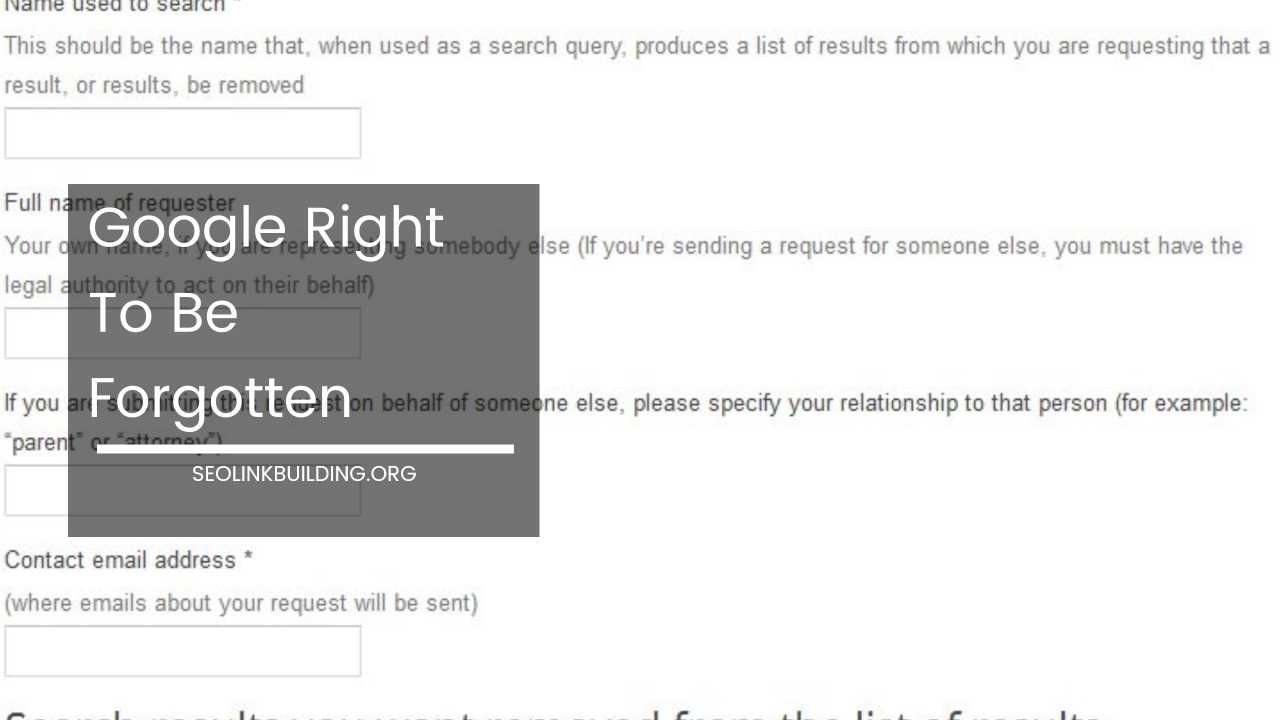Google Right to Be Forgotten

Google’s Right to Be Forgotten: Balancing Privacy and Public Interest in the Digital Age
In the ever-evolving landscape of the internet, the concept of privacy has become increasingly complex. One particularly contentious issue is the “Right to be Forgotten” (RTBF), which grants individuals the ability to request the removal of personal information from search engine results.
Google, the dominant player in the search engine world, has been at the forefront of this debate, grappling with the legal and ethical implications of RTBF.
The Origins of RTBF and its Predecessors
The Right to be Forgotten, while gaining legal traction in 2014, has roots in earlier concepts of privacy and data protection.
Even before the internet age, individuals had a right to control the dissemination of certain personal information. Privacy laws in Europe, for instance, have long protected individuals from the unauthorized collection and dissemination of their personal data.
The rise of the internet, however, presented new challenges. Information, once confined to physical records, could now be easily copied, distributed, and archived online.
The specter of a permanent digital footprint, potentially containing outdated or irrelevant information, raised concerns about the potential for perpetual stigmatization.
The concept of RTBF emerged in response to these concerns. The 2014 landmark decision by the European Court of Justice (ECJ) in the case of Mario Costeja González v Google LLC marked a turning point.
González, a Spanish citizen, objected to search results linking his name to a past debt that had been settled. The ECJ ruled that under the European Union’s General Data Protection Regulation (GDPR), individuals have the right to request search engines to delist links containing inaccurate, inadequate, irrelevant, or excessive personal information.
This decision placed Google in a precarious position, forcing it to navigate the tension between individual privacy rights and the public’s right to access information.
The RTBF Process with Google: Nuances and Challenges
Following the ECJ’s decision, Google established a formal process for individuals to submit RTBF requests. Users can access a web form where they specify the search results they wish to be delisted and explain why the information falls under the criteria outlined by the ECJ. Google then reviews each request on a case-by-case basis, considering factors like:
- Accuracy and Veracity of Information: Is the information demonstrably false or misleading?
- Relevance and Timeliness: Does the information still hold relevance in the context of the individual’s current life? Has enough time passed to render the information outdated or irrelevant to the public interest?
- Nature and Severity of Information: Is the information potentially damaging to the individual’s reputation or livelihood? Does it pertain to sensitive topics like criminal records or medical information?
- Public Interest: Does the information hold value for the public good? For instance, news articles about political figures or public officials may be considered to be in the public interest.
This multi-faceted approach allows Google to weigh the individual’s right to privacy against the potential public interest in accessing the information.
However, the process is not without challenges. Determining the appropriate balance can be subjective, and users may find the process cumbersome and time-consuming.
Additionally, the sheer volume of RTBF requests can create a backlog for Google, leading to frustration for users seeking swift resolution.
Balancing the Scales: Privacy vs. Public Interest and the Nuance of Context
The RTBF presents a complex challenge for Google. Upholding individual privacy rights is crucial in the digital age, where personal information can be easily disseminated and persist indefinitely.
Detrimental information, even if accurate and factual, can have a lasting negative impact on an individual’s life. For instance, RTBF can be a powerful tool for victims of online harassment, revenge porn, or those seeking to move on from past mistakes.
However, unfettered RTBF raises concerns about the potential for censorship and the suppression of important information.
News articles about a politician’s past controversies, public records of financial malfeasance, or historical documents pertaining to past events could be delisted, hindering transparency and accountability. Finding the right balance requires considering the context of the information.
For instance, a news article detailing a politician’s past criminal conviction for a minor offense ten years ago may be considered less relevant than a recent allegation of corruption.
Similarly, a negative online review about a restaurant business that has since changed ownership and management may hold less weight than ongoing complaints about safety violations.
The Global Debate: A Patchwork of Regulations
The RTBF debate extends beyond Europe. While the EU has a strong legal framework for data protection, other countries like the United States have a more hands-off approach to internet regulation.
There is no single global standard for RTBF, making it difficult for Google to implement a consistent policy across its vast international user base.
This creates a patchwork of regulations, where individuals in some countries have greater control over their online footprint compared to others.
Criticisms and Concerns: The Potential for Abuse
Critics of RTBF argue that it empowers individuals to whitewash their pasts and control the narrative surrounding them.
They express concern about the potential for abuse by powerful individuals or entities seeking to suppress negative information, particularly in countries with weak democratic institutions.
Additionally, the process of delisting information can be cumbersome and time-consuming, leaving individuals frustrated and vulnerable, especially those without the technical expertise to navigate the system.
Finding Common Ground: Potential Solutions
The Right to be Forgotten is a complex issue with no easy answers. Google, along with other tech giants, faces the ongoing challenge of balancing individual privacy with the public’s right to access information.
As technology continues to evolve, so too will the debate surrounding RTBF. Here are some potential ways forward:
- Refining the Criteria: A more nuanced approach to evaluating RTBF requests could be developed. Factors like the severity of the information, the passage of time, and the public interest could be weighed more heavily. For instance, a graduated system could be implemented, with easier delisting for demonstrably false or outdated information, and a higher bar for information deemed to be in the public interest.
- Transparency and Accountability: Greater transparency in Google’s RTBF decision-making process is crucial. Users should be informed about the reasons behind approvals or denials, with clear appeal mechanisms established. Independent oversight bodies could be created to review Google’s decisions and ensure fairness.
- Technological Solutions: Technical solutions could be explored to facilitate a more efficient and user-friendly RTBF process. For instance, Google could develop algorithms that automatically flag potentially harmful or outdated information, allowing users to easily request delisting. Additionally, features like “time-bound memory” could be implemented, where information automatically becomes less visible over time.
- Global Standards: International cooperation is needed to develop a more consistent framework for RTBF. This would ensure a level playing field for both individuals and search engines. International treaties or agreements could establish a baseline standard for data protection and RTBF rights, fostering a more balanced approach across the globe.
Final Thoughts: The Future of Privacy in the Digital Age
The Right to be Forgotten is a critical concept in the digital age. It compels us to consider the evolving nature of privacy and the power wielded by search engines like Google.
Finding the right balance between individual privacy and the public interest remains a work in progress. Through ongoing dialogue and collaboration between policymakers, tech companies, and civil society organizations, we can strive to create a digital ecosystem that respects individual rights while safeguarding access to information.
The future of privacy hinges on our ability to navigate these complex issues and develop solutions that protect both individual autonomy and the public good.













